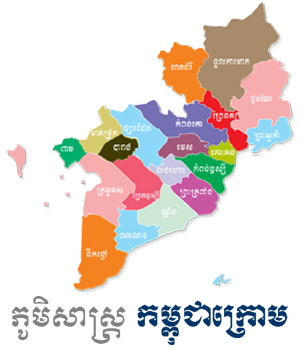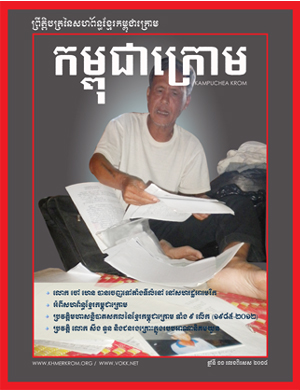
Riot police stand in formation yesterday to prevent the Kampuchea Krom rally to proceed to National Assembly outside Phnom Penh’s Wat Chas pagoda. Hong Menea
About 100 police armed with batons, pistols and rifles blocked the road in front of Phnom Penh’s Wat Chas pagoda yesterday to stop about a dozen activists from marching to the National Assembly to demand a national holiday to mark territorial losses to Vietnam.
The police, standing alongside four large trucks fronted by metal barricades, formed a long line with their shields to block the group from departing on an 8-kilometre trek to deliver a petition demanding that June 4, 1949, be commemorated as a national holiday each year.
The date marks France’s decision to transfer to Vietnam its Cochinchina colony – land that is today southern Vietnam, but which Cambodia and Vietnam warred over for centuries and which many still consider to be Cambodian.
After about 45 minutes, the authorities allowed Khmer Kampuchea Krom Community leader Thach Setha and three cars through the roadblock to deliver the petition to the National Assembly, but blocked anyone else from crossing the line to follow the convoy.

Khmer Kampuchea Krom Community President Thach Setha speaks to the press yesterday at Phnom Penh’s Wat Chas pagoda. Hong Menea
That left Thach Sin Na, a 77-year-old Khmer Krom man, to launch a tirade against the actions of the police. He questioned why the armed presence was so large and accused the officers of serving Vietnam.
“We call you the National Police, but you are police who protect the robbers and take the side of the robbers,” Sin Na said. “The police and soldiers have turned to attack and shoot upon their own nationals.”
“Shoot at your will,” he continued. “We are doing this for the next generation.”
City Hall spokesman Met Measpheakdey said that the march, which would have involved the group crossing the bridge from Chroy Changvar to central Phnom Penh, was blocked by the authorities as it would have caused traffic jams.
At the National Assembly, Setha, a former opposition senator, was allowed inside to deliver his petition. He told reporters June 4 was a date of national significance that should be remembered, and also attacked the police for not allowing the small march.
“We consider June 4, 1949, as the day that the French colonists cut away our Cambodian land to the Yuon,” Setha said, using a term for Vietnamese considered by many to be derogatory, and describing June 4 as “a conspiracy between the French and the Yuon”.
“After the robbers take our land, we aren’t allowed to say that the robbers took our land,” he added.

A man walks in front of riot police yesterday in Phnom Penh. Hong Menea
The thwarted march followed a ceremony to mark the 1949 decision at the same pagoda on Saturday, where Cambodia National Rescue Party official Prince Sisowath Thomico and lawmaker Ho Vann both delivered speeches promising that a future government led by the opposition party would seek the return of southern Vietnam.
A divisive issue, many among the opposition accuse Vietnam of encroaching further into Cambodia with the complicity of Prime Minister Hun Sen, whom Vietnam installed in power in 1985. Two former opposition lawmakers are currently in jail for making such claims.
Ou Virak, head of the Future Forum think tank, said the issue of Vietnam’s role in Cambodia and the divisions it has caused the country would likely continue to be raised as long as the opposition took such a provocative approach and the government repressed dissent.

Riot police stand in formation to prevent a Kampuchea Krom rally yesterday outside Phnom Penh’s Wat Chas. Hong Menea
“We can debate this from the position of adults. There’s no way Cambodia can move forward without discussing this properly – but without the name calling and racism,” Virak said, explaining both sides were now doing little more than angering each other even more.
“They have to take a step back and be mature enough to discuss this in a way that’s measured. It’s a very sensitive topic, so they shouldn’t be adding fuel to the fire,” he said. “It’s the responsibility of both sides to protect the maturity of the conversation.”
Sources: The Phnom Penh Post













